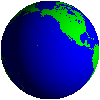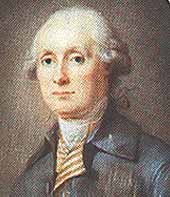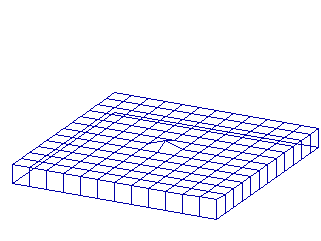

The Physiocrats
![]()
These eighteenth century physiocrats were a group of French thinkers in before the revolution who had considerable influence around the world.
"But when even learned men have once formed themselves into a body, and say we, and think they can impose laws upon public opinion, then public opinion revolts against them, and with justice, for it ought to receive laws from truth alone and not from any authority. Every society soon sees its badge worn by the stupid, the crack-brained, and the ignorant, proud in joining themselves to it to give themselves airs. These people are guilty of stupidities and absurdities, and then their excited opponents fail not to impute folly to all their colleagues.”
Turgot refused to wear their intellectual badge, but, as we shall see, he shared many of their ideas."
Higgs, 1895, p. 7.
These men above "were among the many influential writers in pre-revolutionary France. They believed in the free operation of the laws of the "natural economy." That term in the 18th century must be understood in the context of existing and extensive mercantile regulations, colonialism, slavery and many joint stock companies. Such companies were often granted by governments monopolies over trade such as the Dutch East India Company. This is significant because the Republic of the Netherlands was considered a "liberal" and "tolerant" polity.
The Marquis de Condorcet a member of this group of thinkers is pictured above.
Who were they? | defined | examples | their basic ideas | reviews | writings | other's views of them
"Like Helvetius the Physiocrats regarded pleasure and pain as the two springs of human action and enlightened self-interest as the rule for a well-regulated society."
"they allowed no such role for the legislator; his task is easy , namely, to avoid interfering with the natural operation of economic laws. Since each man was the best judge of his own self interests, the surest way to make men happy is to reduce restrictions on individual effort and initiative. Governments ought, . . . to reduce legislation to the indispensably minimum that will prevent invasions of individual liberty."
George H Sabine, (1961), p.567.
![]()
François Quesnay's Tableau Economique was published in 1758.
During this century the population grew from 600 million to over a billion people on Earth, largely in Asia, but nine of every ten persons were employed in agriculturally related tasks and resided in rural areas.
So the context of these writer's observations drawn from the society in which they lived was a considerable factor in shaping their ideas, arguments, and concepts.
"Physiocracy was a theory of wealth. The physiocrats, led by Quesnay, believed that the wealth of nations was derived solely from the value of agriculture. Quesnay’s understanding of value-added was rather primitive—he could not see, for example, how manufacturing could create wealth. Farmers, on the other hand, could. As Karl Marx explains in Das Kapital, 'the Physiocrats insist that only agricultural labour is productive, since that alone, they say, yields a surplus-value'."
". . . . Rather, it was the physiocrats’ methodological approach to economics that was revolutionary."
Economic history
"Who were the physiocrats?" The Economist. Oct. 11th 2013, 9:31 by C.W. | LONDON
Who were they? | defined | examples | their basic ideas | reviews | writings | other's views of them![]()
Henry Higgs in 1895 delivered six lectures on the Physiocrat's ideas and he said in part:
"The Physiocrats have been the subjects of so many and such divergent appreciations by historians, philosophers, economists, and students of political science, that hardly a single general proposition of importance has been advanced with regard to them by one writer, which has not been contradicted by another.
To de Tocqueville they were doctrinaire advocates of absolute equality. To Rousseau they were the supporters of an odious, if “legal,” despotism. To Professor Cohn they are, in their main proposals, “thoroughly socialistic.” To Louis Blanc they were tainted with a bourgeois individualism. To Linguet their mystic jargon was charlatanical nonsense, not to be understood even by themselves. To Voltaire it was so clear as to be made easily comprehensible to the meanest intelligence. To Taine, as to many others, they made powerfully for revolution. To Carlyle, who speaks ironically of victorious analysis” and scornfully of “rose-pink sentimentalism,” they seem to have been a mere literary ripple on the surface of the great flood.
"To Adam Smith their “system, with all its imperfections, is perhaps the nearest approximation to the truth that has yet been published upon the subject of political economy, and is, upon that account, well worth the consideration of every man who wishes to examine with attention the principles of that very important science.”
"Rossi praised them for conceiving a vast synthesis of social organisation; certain writers, like Mably, have blamed them for a narrow materialism; while there are judges who pronounce them markedly deistic. To many compilers of little text-books, who know better than Adam Smith, they are merely people who lived in the dark ages before 1776, and held some absurd opinions about land."
" . . . the Physiocrats were the first scientific school of political economy."
The Physiocrats were not merely a school of economic thought; they were a school of political action."
p. 7.
"The great French Revolution itself was influenced by their writings."
p. 8
Who were they? | defined | examples | their basic ideas | reviews | writings | other's views of them
"Cantillon sets himself to answer the questions, What is wealth? How does it originate? What are the causes which regulate its distribution among the different classes of society, and determine its circulation not only within the country but between one country and another? "
“Land,” he begins (and this is the keynote of physiocracy), “is the source or material from which Wealth is extracted”; but he continues,"human labour is the form which produces it; and Wealth in itself is no other than the sustenance, the conveniences, and the comforts of life.” He sketches the growth of human societies, beginning with the nomadic stage, and concludes that in all forms of society the ownership of land necessarily belongs to a small number; that in modern societies, after satisfying the claims of farmers and labourers, the surplus product is at the disposition of the landowners, and that their mode of consuming this surplus will determine the nature of national production."
p. 14.
Richard Cantillon’s Essai sur la nature du commerce en general, 1755.
"{a little volume of 430 pages}"p.13.
The book was published by the Marquis de Mirabeau in 1755 because Cantillon, died in 1734. He was an English banker of Irish extraction who wrote about economic reform. His cousin Phillip also wrote on this subject with less analytical skill according to economic historians.
 Henry Higgs
Henry Higgs
Six Lectures
HAMPSTEAD, LONDON, 1896.
![]()
Agrarianism | Utilitarianism | Value | McCloskey | Cycles | Worth | Land and value | Conflicting views








